Introduction
Fleet management software helps efficiently manage and enhance the performance of vehicle fleets, including various types of vehicles like cars, vans, and trucks. Fleet management software is designed to help companies boost their productivity, lower costs, and enhance safety by providing instant information about their vehicle’s status and location and valuable insights on driver behavior and vehicle usage.
It is computer software that handles every aspect of running a modern fleet, including:
- Complete vehicle life cycles: acquisition, maintenance history, and disposal
- Service maintenance & repair requests
- Work management
- Workshop scheduling
- Warranty & claims tracking
- And much more
For fleets who maintain vehicles in-house, services, maintenance and repair issues, MOTs. Warranty claims and compliance can all be completed in the workshop with fleet management software. With the solution’s easily accessible information, reporting and accountability are effortless.
The same can be said for fleets that outsource their maintenance. Fleet software provides complete visibility of what needs to happen and when to ensure fleet operations are getting the best performance from the supporting organizations.
The absence of fleet management software can lead to increased costs, decreased efficiency, and higher risks for the fleet.

Benefits
Save Money
The larger the fleet, the harder it is to save money without proper fleet management software since tracking past, current, and future cost-saving initiatives is challenging. If you don’t know where you are financially, you won’t know how much you’ve saved – or even worse, how much more you’re spending.
Areas that make up the most operating costs for fleets, especially with the increased energy costs across the board, are fuel and vehicle maintenance. For fuel, fleet management software will monitor how much your drivers utilize and how efficiently they’re driving- giving you more insight into how and where to implement cost-saving initiatives. Fleet management software can save organizations money in several ways, including:
- Fuel Savings- Fleet management software can help to reduce fuel consumption by optimizing routes, reducing idle time, and identifying fuel-efficient driving habits. This can lead to significant cost savings. To save more on fuel, automated fuel management software, such as FuelFocus, offers continuous, real-time fuel management over virtually any communication platform.
- Maintenance Savings- Fleet management software can help to reduce maintenance costs by tracking maintenance schedules, identifying potential issues before they become costly repairs, and helping to keep vehicles in good condition. This can lead to fewer breakdowns and repairs, reducing maintenance costs for fleets.
- Insurance Savings- Fleet management software can help reduce insurance costs by providing the tools to track and monitor driver behavior, reducing the likelihood of accidents and improving driver safety. This can lead to lower insurance premiums and reduced liability claims for organizations. AssetWorks FleetFocus fleet management software integrates directly with its GPS fleet tracking solution so managers can access all data under one platform- making it easy for fleet managers to stay on top of driver safety.
Managing Your Drivers
Drivers are responsible, and having one centralized area to keep and update their details and view their history makes accessing and storing information simpler than storing various documents. In addition, having a view of collisions, penalties, and incidents logged, plus being able to pull up a driver’s history, keep notes about driver health, the training they have undertaken, and much more, makes running a fleet easier.
To monitor driver behavior, fleet managers can be notified whenever a driver meets a threshold of ‘high-risk’ behavior. This can help reduce the risk of accidents, fuel consumption, and other maintenance costs.
Health & Safety
Fleet management software should include a driving behavior component. By monitoring driver behavior, fleets can prevent accidents and improve safety. While driver accidents are a work-related risk, effective fleet management software offers the tools to decrease the likelihood of accidents and prioritizes the well-being of drivers.
By maintaining accurate driver records, staying informed about vehicle health issues, and closely monitoring driver hours and behavior, managers can identify ‘high-risk’ drivers and understand when they may benefit from training or specific intervention measures.
Reporting and Analytics
Fleet management has experienced growth in analytics tracking. Fleet management software offers access to in-depth analytics and reporting capabilities allowing fleet managers to assess their fleet’s performance with key performance indicators (KPIs) and make informed choices based on data. The abundance of data lets fleet managers make quicker and smarter decisions.
Reduced Spreadsheets
Implementing the appropriate fleet management software will have major impacts on fleets still relying on spreadsheets. The hours wasted entering data into Excel, resolving importing and exporting issues, communicating updates and changes among staff, rectifying human errors is immense. Adopting the tools specifically designed to address these challenges can unlock new benefits for fleets.
Improved Compliance
Compliance involves maintaining vehicles in a roadworthy condition. By leveraging fleet management software, fleets can streamline their compliance. Fleet management software automatically schedules and tracks vehicle maintenance- including routine inspections, oil changes, tire rotations, and other maintenance tasks. Ensuring vehicles are regularly services and are meeting regulatory requirements, fleets can comply with maintenance and related regulations.

Key Features
Fleet management software offers fleets the features for real-time monitoring of vehicles, so managers have a complete overview of their fleet’s activities, ensuring efficient operations. While fleet management software includes a variety of different features, there are a few that should be included with all fleet solutions:
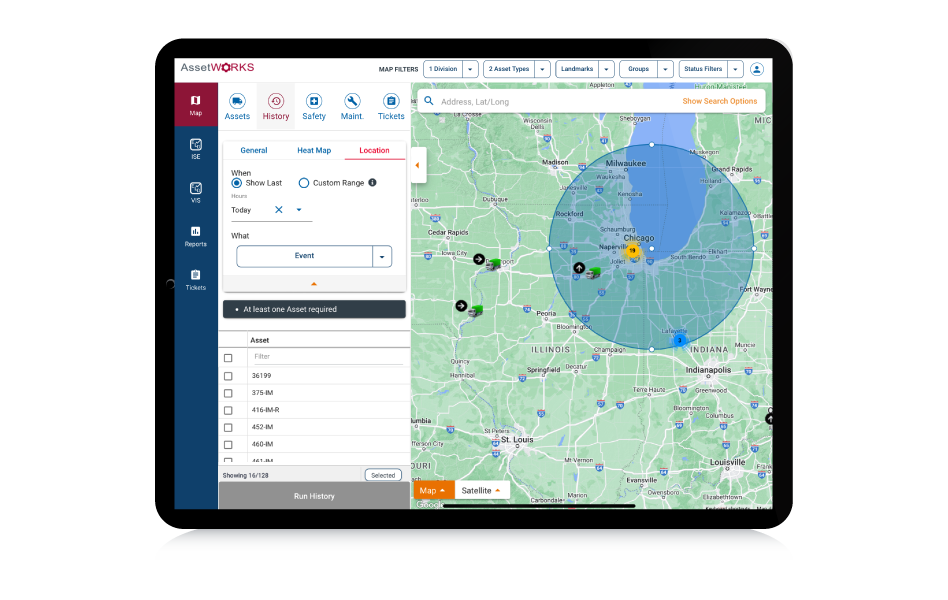
GPS Tracking and Telematics
The software should offer real-time GPS tracking/telematics of vehicles so managers can monitor their driver’s location, speed, and routes. GPS fleet tracking allows managers to optimize driver routes, improve driver response times, and prevent unauthorized vehicle use.
Fuel Tracking and Management
Having the ability to manage fuel helps managers monitor fuel consumption, identify fuel inefficiencies, and track fuel costs. To do so, fuel management software will track fuel consumption in real-time and generate reports to identify trends, reduce fuel expenses, and prevent fuel theft.
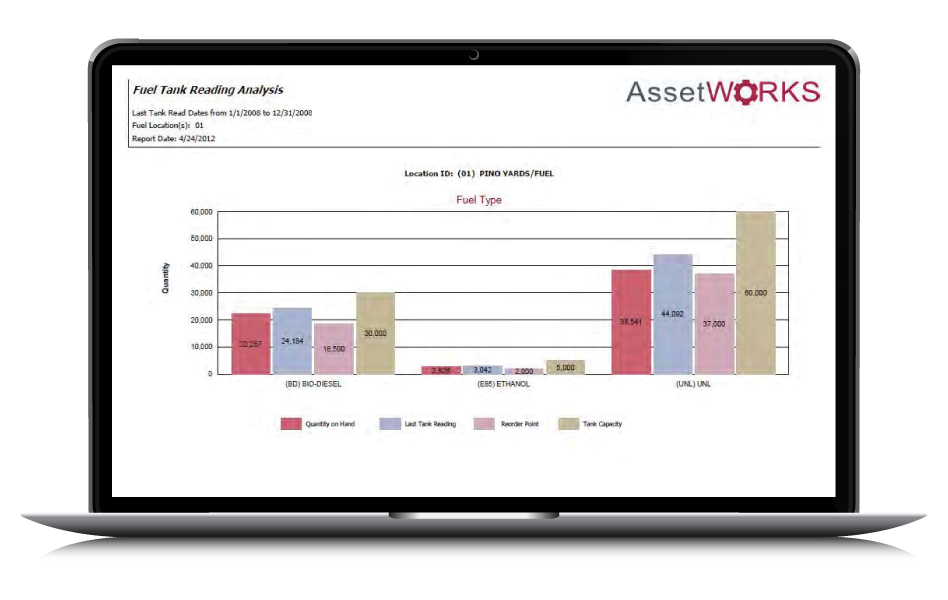
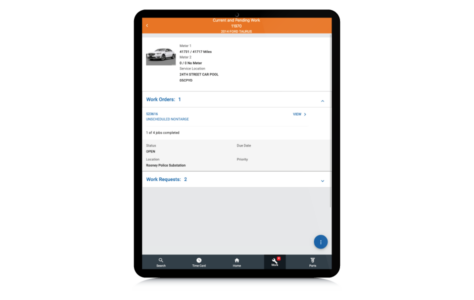
Maintenance Scheduling and Alerts
Fleet management software schedules and tracks vehicle maintenance and repairs. It also can send reminders for routine servicing, track maintenance history, and generate reports so managers can feel assured their vehicles are properly maintained- reducing the risk of vehicle breakdowns and optimizing fleet performance.
Driver Performance Monitoring and Reporting
With the correct fleet management software, managers can retrieve driver scorecards and coaching cools to improve driver performance where needed. Through the collected data, managers can successfully reduce the number of vehicle accidents in their fleet, increase fuel efficiency, and reduce maintenance.

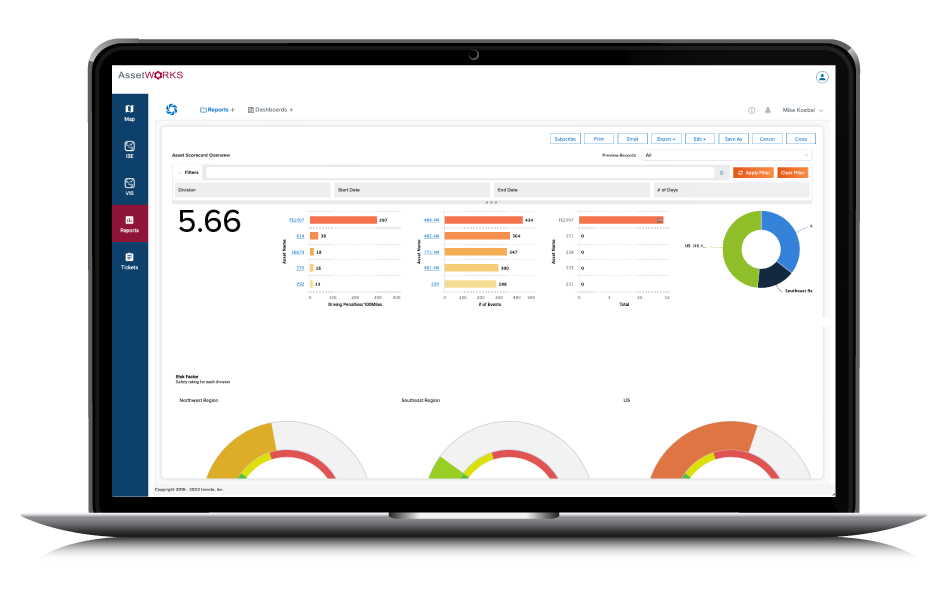
Fleet Utilization and Optimization
Fleet management software offers route optimization and planning tools so fleet managers plan efficient routes, minimize fuel consumption, and reduce overall transportation costs. Data also retrieved by fleet management software helps managers make informed decisions, identify areas of improvement, and optimize fleet operations.
Work Order Management
Without having work order management included in a fleet management solution will lead to more equipment and fleet vehicle breakdowns since they will not receive the proper maintenance. Fleet management software offers a centralized system to track and allocate work orders so managers can determine the order of tasks based on urgency, importance, and available resources.
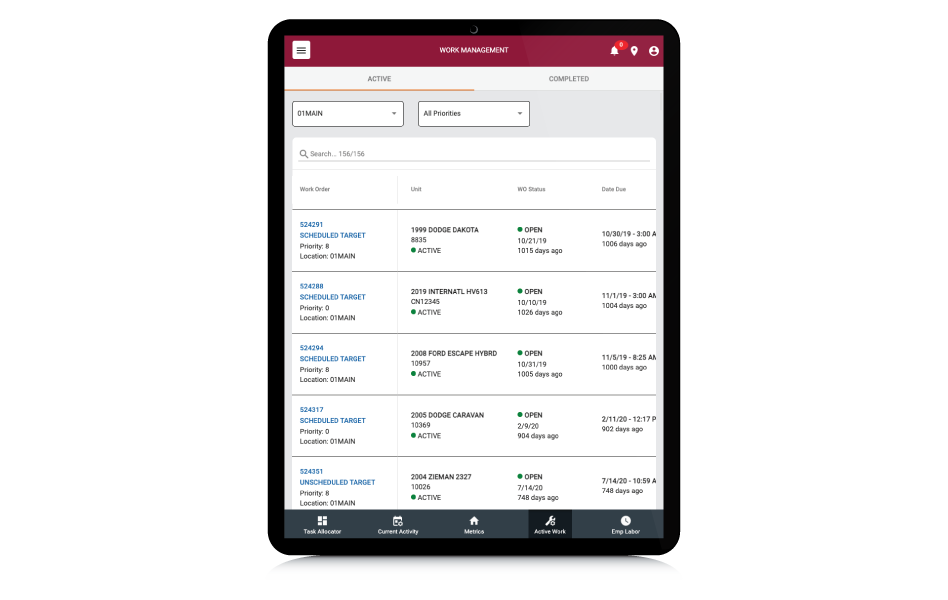

Mobile App
Organizations want to select fleet management software that offers mobile apps, so their team can access information and perform tasks away from the desk or on the road- reducing a fleet’s downtime and errors.
Lifecycle Cost Analysis
Fleet management software should include lifecycle cost analysis so fleets can make informed decisions about their vehicles and equipment throughout their lifespan. Lifecycle cost analysis allows fleets to evaluate the total cost of owning a vehicle over its entire life cycle by accounting for its initial purchase cost, fuel consumption, maintenance and repair expenses, insurance, depreciation, and disposal costs.
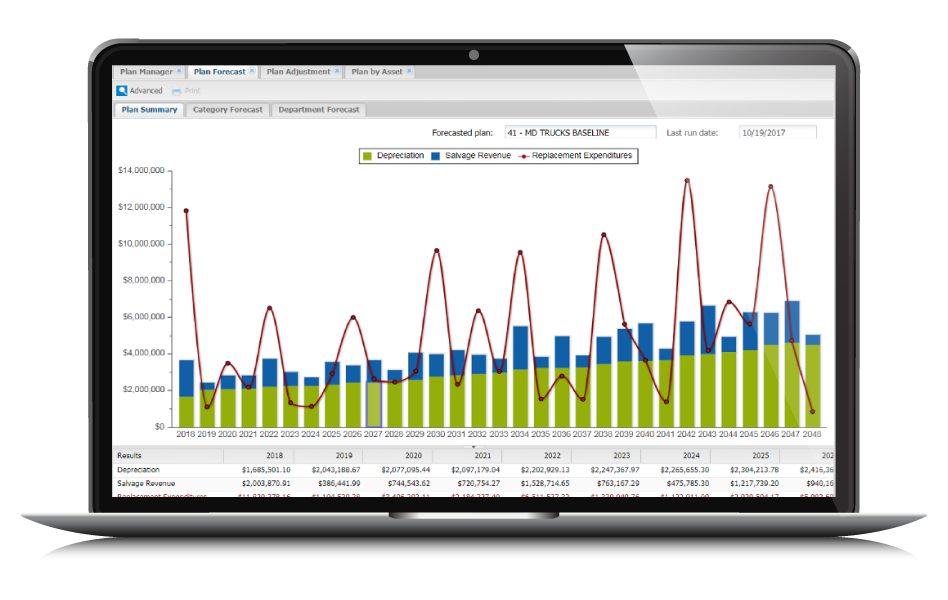
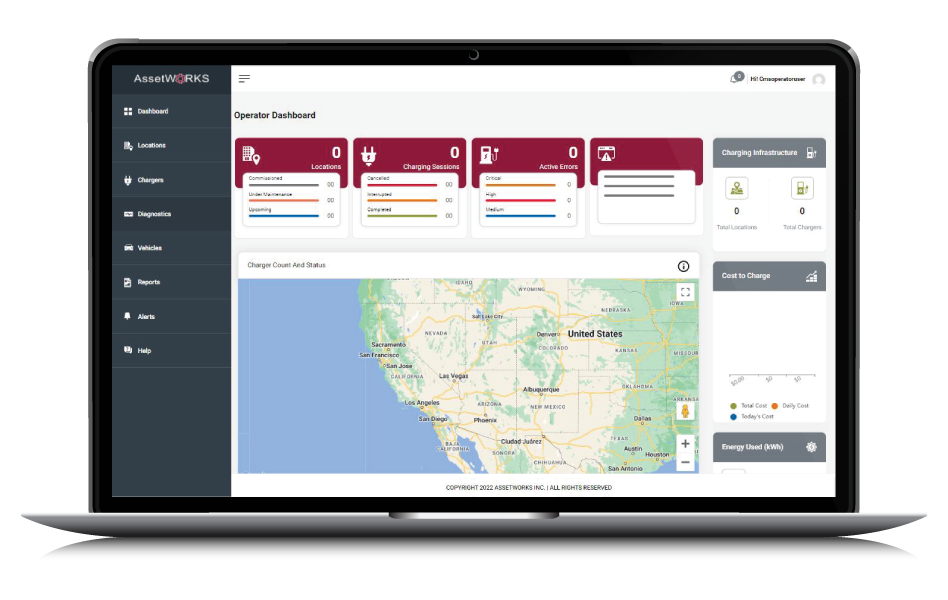
Charge Management Software
With more electric vehicles entering the road, fleet management software should have capabilities to manage electric vehicles. This allows electric fleets to manage their charging infrastructure and offers a centralized location to monitor and control charging stations.
Top Fleet Management Software Solution
AssetWorks Fleet Focus is the premier fleet management software solution for over 550 organizations across North America and the United Kingdom. After investing in AssetWorks fleet management software, fleets have unlocked many benefits that other fleet solutions on the market cannot match.
It is not hard to find fleet management software that collects data, but not all fleet solutions have the tools to compile the data to achieve high excellence. “The application has kept up with the industry. I think it has exceeded in certain areas. There are fewer competitors now, but I think there’s no comparison. I think this product shines,” said Bruce Kilmer, part of The City of Austin’s Senior Management Team, in a case study about AssetWorks FleetFocus.
How to Choose the Best Fleet Management Software
Choosing fleet management software should be a thought-out process. If fleets want to ensure they select the best management solution for their fleet, managers should think of various factors to make an informed decision:
- Identify Needs & Goals
Define your fleet’s needs and objectives by considering fleet size, types of vehicles, desired features, and specific challenges you want to address. - Research Vendors
Look into reputable software vendors by looking at reviews and comparing features. Make sure the solution also aligns with your fleet’s requirements. - Integration Capabilities
Ensure the software you select can integrate with other systems. The integration allows fleets to streamline operations and avoid duplicate data - Mobile Accessibility
Check if the fleet management vendor offers mobile apps so managers can still manage their fleet, even on the go. - Assess Key Features
Determine the essential features your fleet requires in fleet management software. If any software features in the sections above sound valuable, fleets should ensure the features are offered by their selected software vendor. - Seek Testimonials and Customer Support
Review other testimonials from industry peers who use the software you are considering. Additionally, evaluate the quality of customer support offered by the software provider.
Conclusion
If you are considering changing your fleet management software or you are thinking of embracing fleet management software for the first time, there are some questions you will want to ask yourself. The big one, are you actively looking to save money? Even though saving money is a great benefit, it is also about saving time and effort around managing acquisitions for a fleet. Questions to ask yourself include:
- How are your assets performing?
- Do you know if you are getting the best performance out of your assets, and can you prove it?
- Are you optimizing your fleet?
- How much downtime is your fleet suffering due to irregular maintenance?
- How are the lifecycles of your fleet managed, and could it be better?
- Are you doing too much admin?
- What is your data telling you?
- Can you correlate your data to a standard where you can see where improvements can be made and where issues need to be reduced?
- Have you got fuel shrinkage happening with your organization?
- Could you improve your operational performance?
- Is lacking information or unwanted delays and surprises impacting how you deal with customers?
- How do you deal with suppliers?
- Are there issues around your fleet assets that are having an impact on that area?
If you have answered yes to any of these questions, it is time to implement a new fleet management solution within your organization.
Additional Resources
If you would like to learn more about fleet management software and more about AssetWorks’ fleet solution, check out these additional customer references and resources:












